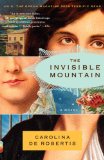Summary | Excerpt | Reading Guide | Reviews | Beyond the Book | Readalikes | Genres & Themes | Author Bio

One night, at the brothel, Diego shattered a chandelier and two
wooden chairs. He was thrown from the building and told not to return.
The next night, at his father's insistence, Ignazio brought their gondola
to dock at the brothel's steps.
"Come with me."
Ignazio shook his head.
His father stepped onto land, drunk, unsteady. He banged the brass
ring against the gilded door. He yelled that he would enter. Three guards
came out and punched him and then dragged him down the steps. They
pushed him into the gondola, which swayed beneath the pressure.
Diego said, "You can't—"
"Shut up," a guard snarled. Ignazio could not see his face; his massive
silhouette turned toward Ignazio. "Can't you control your father? For God's
sake. For your family name."
Ignazio felt a hot and creeping slime beneath his skin. He longed to
leap into the dark canal and swim very far and never come back. He
nodded and pushed the gondola out onto the water.
Six months later, on a cold winter night, Diego cracked his wife's skull
against the wall and loped outside. The canal growled under the wind.
From the window of his room, Ignazio saw his father's shadow teeter on
the edge of the canal, then fall as if thrown from an invisible fist.
Ignazio lay silent until he heard his sister-in-law's cry from the
kitchen—dead, dead, Mamma is dead. He closed his eyes. His mother
flooded across his mind: embracing him at six years old when he'd
scraped his knee, her thick breasts covering his ears so that they filled
with sounds like the inside of a shell; humming, tenor-low, while kneading
dough for gnocchi in the kitchen; watching him as he put his coat on
with his brothers, flesh swollen around her eyes. His chest burned. If his
father had not thrown himself into the water, Ignazio could have killed
him with bare hands. He heard Nonno sit up in the bed across from his.
"Eh? What happened?"
Ignazio spent the next five hours cleaning blood from the walls and
the body.
Two days later, Diego's body washed up at the front steps of a count
whose gondola order had never been completed. He surfaced just in
time to make the journey to San Michele with his wife.
The corpses crossed the water, thronged by the living. The sky was
pale with shock. A fleet of mourners—sons, daughters, wives and husbands,
children, great-aunts, uncles, drenched in black—rode their gondolas
in an entourage behind the coffins. San Michele loomed before
them, with its township of tombs, soaking in the prayers and wails that
ebbed over the water.
Ignazio rowed numbly. The world was not the world but a mere
painting of itself; apart; impenetrable; all the grieving people only brushstrokes;
he in the midst of it, pretending to be real, wearing a life of
someone else's making. Only Nonno Umberto still seemed viscerally
true. His breath labored as they disembarked, audible through the drone
of Hail Marys. He leaned on Ignazio's arm. He smelled of soap and vinegar
and a bitter trace of sweat.
Sepulchral rows, priestly mutterings, aunts weeping, slate moved
aside to lower caskets into ground. Ignazio watched the remains of
his parents (man and wife, he thought, killer and killed) sink slowly,
together, into the dark. The stone slab groaned as his brothers pushed it
back into place, shutting in the dead.
"Ignazio," his grandfather said. "Take me for a walk."
They escaped the praying crowd and walked the cobbled path. The
tombs of the rich loomed around them, edifices twice the size of the
Firielli kitchen, wrought with statues. Sylphs and ancient gods and grieving
angels gazed their way. They moved past them to a row of simple
tombs, unadorned boxes submerged in the ground. Nonno stopped at
one of them. Ignazio read the names etched into marble: porzia
firielli. donato firielli. armino firielli. rosa firielli. eracla firielli. isabella firielli. He chanted them, one after the
other, in his mind, Porzia, Donato, Armino, Rosa, Eracla, Isabella, his
aunts, his uncles, frozen children, unknown ghosts.
Excerpted from The Invisible Mountains by Carolina De Robertis Copyright © 2009 by Carolina De Robertis. Excerpted by permission of Knopf. All rights reserved. No part of this excerpt may be reproduced or reprinted without permission in writing from the publisher.
Your guide toexceptional books
BookBrowse seeks out and recommends the best in contemporary fiction and nonfiction—books that not only engage and entertain but also deepen our understanding of ourselves and the world around us.